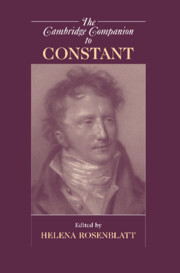Book contents
- Frontmatter
- Introduction
- 1 Benjamin Constant: Life and Work
- Part I The Political Thinker and Actor
- Part II The Psychologist and Critic
- 8 Constant and Women
- 9 Individualism and Individuality in Constant
- 10 Literature and Politics in Constant
- 11 The Theory of the Perfectibility of the Human Race
- Part III The Analyst and Historian of Religion
- Conclusion
- 15 Eclipses and Revivals Constant’s: Reception in France and America 1830-2007
- Bibliography
- Index
- Series List
10 - Literature and Politics in Constant
from Part II - The Psychologist and Critic
Published online by Cambridge University Press: 28 July 2009
- Frontmatter
- Introduction
- 1 Benjamin Constant: Life and Work
- Part I The Political Thinker and Actor
- Part II The Psychologist and Critic
- 8 Constant and Women
- 9 Individualism and Individuality in Constant
- 10 Literature and Politics in Constant
- 11 The Theory of the Perfectibility of the Human Race
- Part III The Analyst and Historian of Religion
- Conclusion
- 15 Eclipses and Revivals Constant’s: Reception in France and America 1830-2007
- Bibliography
- Index
- Series List
Summary
That Constant saw a close relationship between his literary and his political writing is evident from the title of his Mélanges de littérature et de politique, published in 1829, one year before his death. It is also evident from the way Constant structured this collection, which became his intellectual testament. The key essay on “Literature in Its Relations to Liberty” is placed squarely in the center of the book. (It is the tenth of twenty essays.) But it does not divide the book into a literary and a political half. On either side of the central essay are pieces covering a variety of topics, and the final essay of the collection suggests that the ability to move easily between one domain and the other is itself a sign of political freedom. “There are periods in history when man seems to enjoy the fullness of his faculties. The arts, the professions, the talents are not such separate spheres as to prevent him from passing from one to the other…. It is especially or even exclusively in free states that are observed that speedy and varied application of every faculty to every need” (p. 469). Such a statement also shows that Constant’s political vision is not the narrowly “liberal” one of people pursuing their private interests with little concern for citizenship. On the contrary, it is in the absence of freedom that a sharp division of labor arises, so that “the writer abstains from action, the warrior from thinking, and the statesman from writing” (p. 470).
- Type
- Chapter
- Information
- The Cambridge Companion to Constant , pp. 225 - 247Publisher: Cambridge University PressPrint publication year: 2009



